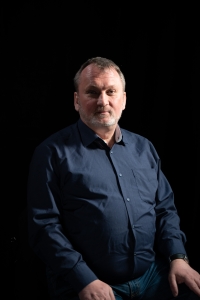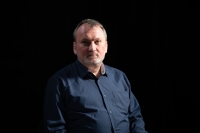I remember how we called from the hall to the rector of the university that we would not start school.
Róbert Schmidt was born on May 15, 1968 in Bojnice. His mother Valéria, née Pinterová, was born in 1938 in the village of Kolta, located in southern Slovakia. As a result of the First Vienna Arbitration, she spent her early childhood in the occupied territory. She had Hungarian citizenship for seven years. Father Karol Schmidt was born in 1932 in Bardejov to a Slovak-German family. After the end of the Second World War, the father‘s family was a victim of the persecution of members of the German minority in Czechoslovakia. Róbert spent his childhood and adolescence in Prievidza, where his family moved for work.From early childhood, he had a positive relationship with nature, which led him to the Slovak Union for Nature and Landscape Protection in Prievidza (SZOPK) in high school. While working in the SZOPK, he and his colleagues prepared an action plan to combat illegal dumping in the cottage area near Prievidza. Finally, it was not implemented for political reasons. After graduating from Secondary school of Vavrinec Benedikt Nedožerský in Prievidza, he joined the Technical University of Košice (VŠT) in 1986. After the outbreak of the Velvet Revolution, he became a member of the student strike committee, where he actively participated in the fight for freedom and democracy. In December 1989, as a member of the strike committee, he had the opportunity to be part of the strike of the prisoners of the Košice-Šaca correctional facility. In 1992, he started his doctoral studies at VŠT. However, due to financial reasons, he left his studies and worked at the university only as an assistant professor. In 2002-2003, he completed a scholarship stay at the Academy of Mining and Metallurgy in Krakow. He has been working in Krakow since 2003, where he completed a course to become a tourist guide. He had the opportunity to collaborate on the preparation of the route for the Vrba–Wetzler Memorial and the memorial expedition Following the Traces of hidden children, which is organized by Post Bellum SK. He currently works as a professional tourist guide in Krakow.

